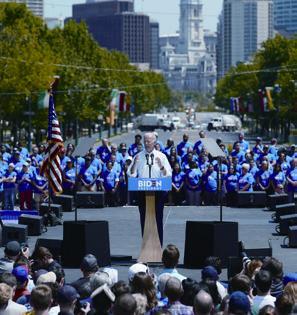Hobson’s Choice?
By Gao Yang
It is now clear that Barack Obamas vice president Joe Biden is going to challenge sitting President Donald Trump as the presumptive Democratic nominee after Senator Bernie Sanders dropped out of the 2020 presidential race on April 8 and Obama endorsed Biden a week later. This is the first time in nearly two decades that the Democratic Party has come together to identify and endorse a candidate so early in a primary election.
An orthodox nominee
Biden, who became a senator in 1972, was elected to the Senate six times in a row. During his tenure in the Senate, he worked as chair of the Foreign Relations Committee, the International Narcotics Control Caucus as well as the Judiciary Committee.
The Violent Crime Control and Law Enforcement Act of 1994 was drafted by him, and its provisions on protecting women from violence were the first comprehensive protection specially formulated for women in U.S. history.
Bidens eight-year service to Obama, the fi rst U.S. president of African origin, has helped him win the support of non-white voters. They, especially African Americans, have turned their nostalgia for Obama into support for Biden, which became evident in the South Carolina primary. There Biden turned the situation around with two thirds of the black vote, placing him 44 percentage points ahead of his competitors. It was his appeal among black voters that helped him beat Sanders by a large margin and make a comeback on Super Tuesday on March 3, when voters in 14 states cast ballots for their presidential primaries.
Bidens long-time political career as a moderate makes people assured that there wont be any great uncertainty once he is elected.
This has made the 77-year-old acceptable to the vast majority of the Democrats as well. In the absence of any other outstanding candidate, Biden seems to be able to mobilize all the forces in the party.
While this doesnt guarantee victory in the November 3 election, it bodes well for the Democrats. The party can now focus more on raising money and employing a campaign team. Obamas support is also a valuable asset for Biden to gain more voters.

With this election fought against the backdrop of the novel coronavirus pandemic, Guy Cecil, political director of Hillary Clintons campaign in 2008, said Biden now faces two major tasks: to unite the Democrats and defeat Trump, and to win more support while tackling the pandemic and the possible economic crisis that will follow.
Bidens popularity among the younger generation has been low, while Sanders won the support of voters under 30. According to data from The Washington Post and ABC News in March, 15 percent of Sanders supporters said they might vote for Trump if Biden becomes the Democratic nominee.

Trump was quick to incite Sanders supporters after hearing he had quit, tweeting that this was exactly what the Democrats and the Democratic National Committee wanted and that Sanders supporters should join the Republican Party. According to Mark Melman, a Democratic poll analyst, the more Sanders pushes his supporters to vote for Biden, the more likely Biden is to defeat Trump.
The presidential election still remains full of uncertainty due to the worsening pandemic. Trumps performance in steering the country through this will be probably the deciding factor. But his poor response to the outbreak at the outset has actually given the Democrats more hope. There are also mixed reactions to Trump deciding to suspend funding for the World Health Organization, with his critics accusing him of trying to fi nd a scapegoat for his mishandling of the pandemic.
Stand on China
If Trump is reelected, his policy toward China might become more brazen without the worry of having to face another election. And he will continue to use trade as a pawn to pressure China. While implementing the phase-one economic and trade deal reached with China in December 2019, Trump will try to bargain for a more favorable phase-two deal for the U.S.
He might also take more steps to decouple from China in sectors such as technology and fi nance as an attempt to contain Chinas growing infl uence in the international arena.
The bilateral relations could worsen if Trump tries to engage in an all-out confrontation. Using populism and economic nationalism as his banners, he might point a fi nger at China more and try to interfere in Chinas internal affairs.
On the other hand, if Biden becomes the next U.S. president, he will also certainly follow a hard line on China, and this might become more apparent in the ideological sphere. The ideological spectrum of the U.S. has already become increasingly hawkish toward China and Biden might put greater pressure on China concerning issues such as human rights, and adopt a more aggressive policy than the Trump administration.
However, unlike Trump, Biden is likely to rely more on the role of U.S. allies to contain China as the Democrats have long valued allies as the bedrock of U.S. engagement with the world.
Still, Biden may consider better cooperation with China than the Trump administration did. He may continue to hold the mainstream opinion and see China as a strategic competitor, but put his efforts in enhancing cooperation with China within multilateral organizations and on global issues such as climate change.
In general, judging from the current political atmosphere in the U.S., whether Trump is reelected or Biden wins the White House, they will not change their tough stance toward China. But there may be differences in their understanding of competitive cooperation or confrontational cooperation with China.

